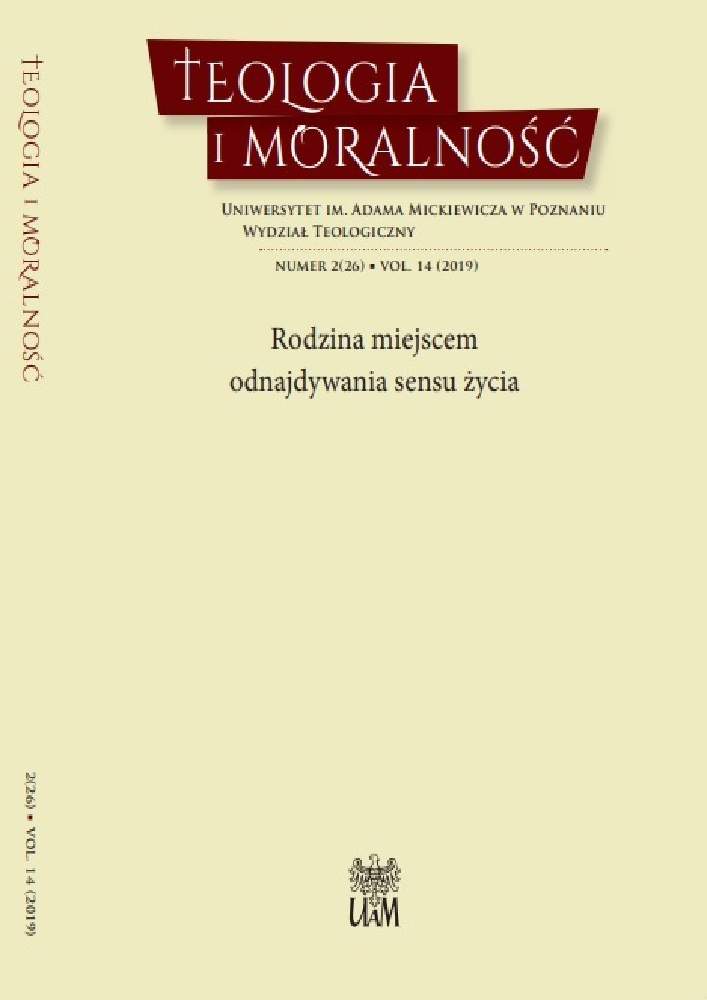Abstrakt
Knowledge of the moral teaching of the Roman Catholic Church is generally scarce, even among believers. This situation contributes to numerous misunderstandings concerning the Church’s position within the public debates of new proposals like IVF or sexual morality (eg. the LGBT movement). It seems to outsiders that the Church’s standpoint is based on some old and outdated convictions incomprehensible for people today. Meanwhile for the Church, which is concerned with the overall well-being of each man, this well-being is the main reason for its viewpoint and teaching. Although the Church’s explanation is not based exclusively on philosophical reasons (i.e. based on human reason and thus intelligible for all people of good will) these reasons play an important role in the dialogue between the Church and the contemporary world. One of the Church’s most important rationales refers to the concept of human personal fulfilment and basic human goods.
Bibliografia
Abbà G. (2003), Esame epistemologico della teologia morale di San Tommaso d’Aquino, w: Quale filosofi a in teologia morale? Problemi, prospettive e proposte, red. P. Carlotti, Roma.
Ashley B.M. (1994), What is the End of the Human Person? The Vision of God and Integral Human Fulfi llment, w: Moral Truth and Moral Tradition: Essays in Honor of Peter Geach and Elisabeth Anscombe, red. L. Gormally, Dublin, s. 68-96.
George R.P. red. (1994), Natural Law Theory. Contemporary Essays, Oxford.
Grisez G. et al. (1983), The Way of the Lord Jesus, Vol. One, Christian Moral Principles, Chicago.
Hittinger R. (1987), A Critique of the New Natural Law Theory, Notre Dame.
Huber C. (1994), Limiti della validità del sapere scientifi co, w: Lineamenti di etica della sperimentazione clinica, red. A.C. Spagnolo, C. Huber, Milano, s. 29-38.
Kania D. (2019), Zniszczyć cywilizację, „Gazeta Polska” #31 (1355) 31/07, s. 6-9.
Kraj T. (2008), Wokół dyskusji na temat zapłodnienia in vitro, „Teologia i Moralność” 4, s. 107-118.
Kraj T. (2010), Granice genetycznego ulepszania człowieka, Kraków.
Machinek M. (2018), Przesłanie Humanae vitae z perspektywy pięćdziesiątej rocznicy ogłoszenia encykliki, „Teologia i Moralność” 2, s. 13-27.
May W. (2003), Introduction to Moral Theology, Huntington.
Mroczkowski I. (2011), Teologia moralna. Defi nicja. Przedmiot. Metoda, Płock.
Nykiel M. (2019), Operacja „Białystok”, „Sieci” Nr 30 (348), s. 22-25.
Pinckaers S.Th. (1999), The Place of Philosophy in Moral Theology, w: Faith and reason: The Notre
Dame symposium 1999, red. T.L. Smith, The Maritain Center, United States, s. 10-20.
Rhonheimer M. (1994), La prospettiva della morale. Fondamenti dell’etica fi losofi ca, Roma.
Publikacje internetowe
Anon, Benedykt XVI skomentował reakcje na jego tekst o przyczynach pedofi lii w Kościele, https:// www.tvp.info/44116463/benedykt-xvi-skomentowal-reakcje-na-jego-tekst-o-przyczynachpedofilii-w-kosciele , [dostęp: 30.08.2019].
Anon, Senator Pociej o abpie Jędraszewskim i “tęczowej zarazie”: Jako głos PO mówię, że to skandaliczne słowa, http://www.tokfm.pl/Tokfm/7,103087,25053883,senator-pociej-a-abp-jedraszewskim-i-teczowej-zarazie-jako.html [dostęp: 27.08.2019].
Colosi P.J., What’s Love Got to Do With It? The Ethical Contradictions of Peter Singer, https://oldarchive.godspy.com/issues/WHATS-LOVE-GOT-TO-DO-WITH-IT-The-Ethical-Contradictionsof-Peter-Singer-by-Dr-Peter-J-Colosi.cfm.htm [dostęp: 30.08.2019].
Lee Y., Kang E., Stem cells and reproduction, http://www.bmbreports.org/journal/view.html?uid=1400&vmd=Full& [dostęp: 17.12.2019].
Moressi A., Procreazione assistita. Embrioni congelati, la città dimenticata, https://www.avvenire.it/famiglia-e-vita/pagine/embrioni-congelati-la-citt-dimenticata [dostęp: 26.08.2019].
VS, wiki, Fabryka czystych rasowo ludzi. Horror w domu surogatek Hitlera, https://www.fakt.pl/wydarzenia/swiat/lebensborn-fabryka-dzieci-esesmanow/hfs44wh#slajd-2 [dostęp: 26.08.2019].
Licencja

Utwór dostępny jest na licencji Creative Commons Uznanie autorstwa – Bez utworów zależnych 4.0 Międzynarodowe.

